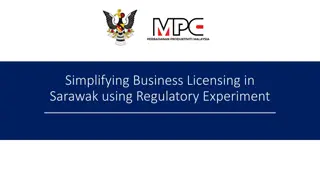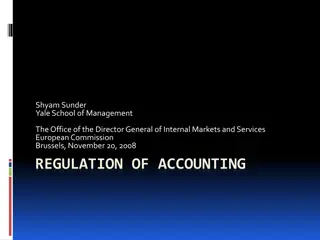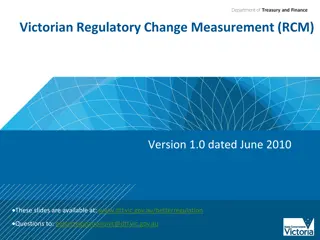Understanding the Contract of Agency in Business Regulatory Framework
A contract of agency establishes the relationship between an agent and a principal, allowing the agent to act on behalf of the principal in dealings with third parties. Essential features include the competence of the principal, agreement between parties, intention of the agent, and free consent. Agencies can be created through express or implied agreements, estoppels, necessity, holding out, or ratification by the principal.
- Contract of Agency
- Business Regulatory Framework
- Principal-Agent Relationship
- Express Agreement
- Implied Agreement
Download Presentation

Please find below an Image/Link to download the presentation.
The content on the website is provided AS IS for your information and personal use only. It may not be sold, licensed, or shared on other websites without obtaining consent from the author. Download presentation by click this link. If you encounter any issues during the download, it is possible that the publisher has removed the file from their server.
E N D
Presentation Transcript
WELCOME Class: B.Com Part-2 Subject: Business Regulatory Framework TOPIC: CONTRACT OF AGENCY Part-A Prepared By Dr. SHAHID IQBAL Guest Faculty, Marwari College, Darbhanga, Mobile No. and Whatsup No. : 7004160257 Email ID: shahidlnmu@gmail.com 1
Contract of Agency: It is a contract which creates the relationship of agent with principal is known as agency. According to sec.182 of the Contract Act, an agent is a person employed to do or to represent another in dealings with third person. The person for whom such act is done or who so represented, is called the principal. Thus, an agency is the relation between an agent and his principal created by an express or implied agreement whereby an agent is authorized by his Principal to act or represent him in dealing with third parties and to establish principal s contractual relations with them. 2
Essential Features of Agency: 1. The principal should be competent to contract: Any person who is major and of sound mind can employ an agent. A lunatic or a drunken person cannot employ an agent. 2. An agreement: Agency should be created by an agreement between the principal and the agent. Such agreement may be either express or implied. 3. Intention of the agent: Intention of the agent to act on behalf of the Principal is also an essential feature of the contract of agency. 4. No consideration is necessary:- According sec.185, No consideration is necessary to create an agency. Generally an agent is remunerated by way of commission for service rendered, but no consideration is immediately necessary at the time of creating an agency. 5. Free consent: An agreement of agency depends up on free consent of the principal and agent. 3
Creation of an Agency: An agency may be created in any of the following ways:- 1. Agency by express agreement: - When an agent is appointed by words, spoken or written is called agency by express agreement. 2. Agency by implied agreement:- It includes a) Agency by estoppels: Estoppels means preventing a person from denying a fact. According to sec. 237 of the contract act lays down that, when an agent has, without authority done acts or incurred obligations to third persons on behalf of his principal, the principal is bound by such acts or obligations if he has by his words or conduct induced such third persons to believe that such acts and obligations were within the scope of the agent s authority. b). Agency by necessity: In some extra ordinary circumstances, a person who is not really an agent should act as an agent of another. Such an agency is called agency by necessity. 4
c). Agency by holding out:- It is a branch of the agency by estoppels. In this case some affirmative conduct by the principal is necessary. Where a person permits another by a long course of conduct to pledge his credit for certain purposes, he is bound by the act of such person in pledging his credit for similar purposes, though in some cases without the previous permission of his master. 3. Agency by ratification (Ex-post facto agency): Ratification means subsequent acceptance by the principal in all respect of an act done by the agent without authority. Sometimes the agent may act without the authority of the principal. If the principal accepts or ratify subsequently the act of the agent, he is said to have ratified the act. For example, X without Y s authority, lends Y s money to Z. Afterwards Y accepts interest from Z. Y s conduct implies a ratification of the loan. 5
Duties of an Agent: Duties of an agent to Principal: 1. Duty to follow directions given: An agent must conduct the business of the principal according to the directions given by the principal. In the absence of any direction, should conduct according to the custom. 2. Duty to act with skill and diligence: - An agent is bound to conduct business of the agency with as much skill as is generally possessed by persons engaged in similar business unless the principal has notice of his want of skill. 3. Duty to render accounts: It is the duty of an agent to keep the money and property of the Principal separate and to keep true and correct accounts of all his transactions on behalf of the principal and to produce the sake to his principal whenever he demands. 4. Duty to communicate in case of difficulty: In cases of difficulty it is the duty of the agent to communicate with his principal and get his instruction. Otherwise any act of loss will not bind the principal. 6
5. Duty to pay the amounts received for the principal: It is the duty of the agent to pay overall money received on behalf of the principal subject to any lawful deductions for remunerations or expenses properly incurred. 6. Duty not to delegate his authority: An agent cannot delegate his authority to another person unless authorized or warranted by the usage of trade or nature of the agency. 7. Duty on termination of agency by principal s death or insanity:- When an agency is terminated by the principal s death or becoming of unsound mind, the agent is bound to take on behalf of the representatives of his late principal, all reasonable steps for the protection and preservation of the interest entrusted to him. 8. Duty not to disclose confidential information: It is very important not to disclose the confidential information relating to the business of agency. 7
9. Duty not to deal on his own account: An agent should not deal on his own account in the business of agency. If an agent, without the knowledge of his principal, deals in the business of the agency on his own account, the principal may either repudiate the transaction or claim from the agent any benefit which may have resulted to him from the transactions. Thank You 8























